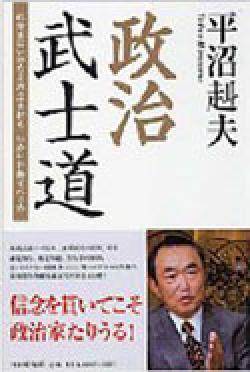Seiji Bushido (Samurai Ways of Politics)

PHP, June 2007, 240 pages. Price: ¥ 1400. ISBN-13: 978 – 4569693064
Review by Fumiko Halloran
Takeo Hiranuma believes the US government had undue influence on Koizumi’s reforms of the postal and savings system. By privatizing a system that had assets of 340 trillion yen, it was targeted as a lucrative market by the American insurance industry.
Takeo Hiranuma, born in 1939, grew up in a political family. His adoptive grandfather was former Prime Minister Kiichiro Hiranuma during World War II and later President of the Privy Council. On August 15, 1945, the Hiranuma residence was attacked by fanatical soldiers who tried to kill Hiranuma. Unable to find him, they set fire to the house while Hiranuma escaped with the help of a security guard. Young Takeo vividly remembers that ordeal. After Japan’s defeat, Kiichiro Hiranuma was imprisoned for life as a Class A war criminal and died in prison at the age of 84.
After having worked as a businessman in the textile industry, Takeo Hiranuma ran twice unsuccessfully for the House of Representatives before getting elected from an Okayama Prefecture district. In his first run, he campaigned on revision of the constitution that he believed was forced on Japan by the Occupation. Traditional campaigns are run on local issues such as jobs and road construction but he stuck with this national theme and got elected on the third try.
He served as Minister of Economy, Trade & Industry under Prime Minister Junichiro Koizumi but his opposition to Koizumi’s reform, particularly in privatizing the postal system, cost him dearly. He was censured by the LDP, resigned from the party, and formed a faction of independent politicians. Hiranuma suffered a stroke in 2006 but recovered and is active again.
Yosano and Hiranuma have personal memories of the war and their political beliefs derive directly from that experience. Aso, a toddler when the war ended, nevertheless witnessed the hardships of Japanese life then. In contrast, Yuriko Koike and Shigeru Ishiba are truly of the post-war generation, having been born in 1952 and 1957 respectively.

